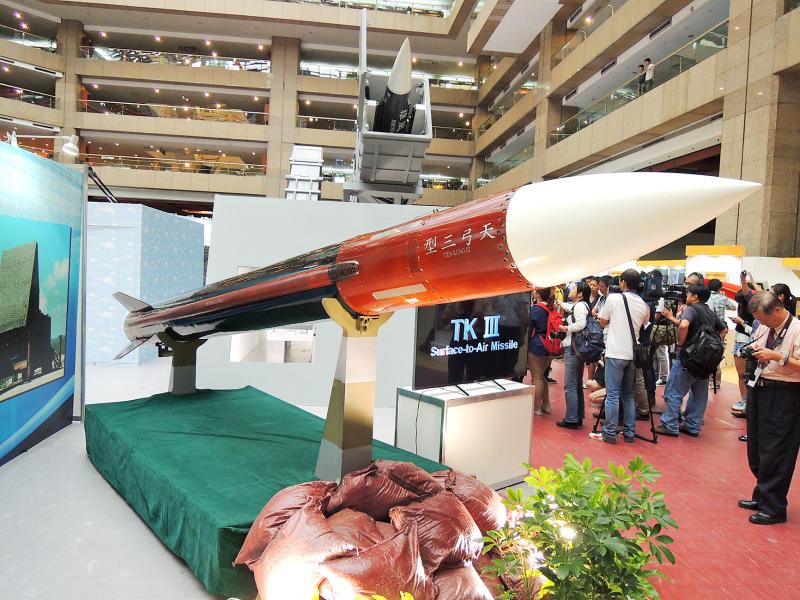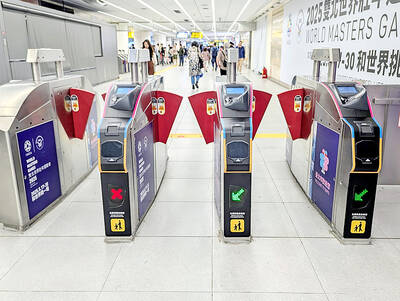Democratic Progressive Party (DPP) lawmakers and legal experts yesterday demanded tougher laws and punishments for fraud that affects national security.
The Chungshan Institute of Science and Technology on Wednesday denied that national security was compromised after Mirror Media magazine reported that two local contractors, Onsen Taiwan Cosmetics Corp (昂神國際) and Burnaby Light Technology Corp (勳章科技), which were involved in the production of indigenous Tien Kung (“Sky Bow”) missiles, had for their own gain allegedly used inferior silicone rectifiers sourced from China in its ignition systems.
“The contractors allegedly made illegal profits of more than NT$100 million [US$3.59 million], by using poor-quality and inexpensive Chinese-made components in place of specified parts for Sky Bow missiles. This severely undermined our national security,” said attorney Huang Di-ying (黃帝穎), who is also director of the Taiwan Forever Association.

Photo: Lo Tien-pin, Taipei Times
“The legal offenses would likely only be fraud and forgery with a five-year prison sentence or less,” Huang said. “Such a penalty does not match the severity of the crime and its effect on military defense security.”
Huang said that legislators should amend the National Security Act (國家安全法) to create tougher sentences for criminal misconduct involving military procurement programs.
Under the act, the law is contravened when contractors are found receiving instructions from Chinese agents, then passing those instructions to Taiwanese government or military officials, he said.
“However, prosecutors have difficulty tracing and uncovering such evidence,” he added.
DPP Legislator Tsai Shih-ying (蔡適應) said that public opinion supports greater punishments for fraud or corruption in military procurement that damages national security.
Tsai suggested legal amendments that impose an additional 50 percent on the sentencing handed down from a judge, as is done with contraventions of the Criminal Code of the Armed Forces (陸海空軍刑法).
“Military procurement is administered under the Government Procurement Act (政府採購法), which does not allow imposition of stronger punishments,” he said.
DPP Legislator Lo Chih-cheng (羅致政) said that the Chungshan institute is managed by the Minsitry of National Defense for research and production of advanced indigenous-made weapons, which is different from incorporated institutes that focus on education and culture.
“Applying regular laws on government procurement is insufficient to deter corruption and fraud within military and national security areas,” he said.
Lo also accused the institute of negligence and dereliction of duty.
“Regarding the Sky Bow missile incident, the critical phase was in examining and testing the product. Institute officials should have prevention measures and stricter oversight mechanisms to determine whether the components originated in China,” he said.
The institute should do more to deter fraud, graft and forgery, Lo added.

A magnitude 6.4 earthquake struck off the coast of Hualien County in eastern Taiwan at 7pm yesterday, the Central Weather Administration (CWA) said. The epicenter of the temblor was at sea, about 69.9km south of Hualien County Hall, at a depth of 30.9km, it said. There were no immediate reports of damage resulting from the quake. The earthquake’s intensity, which gauges the actual effect of a temblor, was highest in Taitung County’s Changbin Township (長濱), where it measured 5 on Taiwan’s seven-tier intensity scale. The quake also measured an intensity of 4 in Hualien, Nantou, Chiayi, Yunlin, Changhua and Miaoli counties, as well as

Credit departments of farmers’ and fishers’ associations blocked a total of more than NT$180 million (US$6.01 million) from being lost to scams last year, National Police Agency (NPA) data showed. The Agricultural Finance Agency (AFA) said last week that staff of farmers’ and fishers’ associations’ credit departments are required to implement fraud prevention measures when they serve clients at the counter. They would ask clients about personal financial management activities whenever they suspect there might be a fraud situation, and would immediately report the incident to local authorities, which would send police officers to the site to help, it said. NPA data showed

ENERGY RESILIENCE: Although Alaska is open for investments, Taiwan is sourcing its gas from the Middle East, and the sea routes carry risks, Ho Cheng-hui said US government officials’ high-profile reception of a Taiwanese representative at the Alaska Sustainable Energy Conference indicated the emergence of an Indo-Pacific energy resilience alliance, an academic said. Presidential Office Secretary-General Pan Men-an (潘孟安) attended the conference in Alaska on Thursday last week at the invitation of the US government. Pan visited oil and gas facilities with senior US officials, including US Secretary of the Interior Doug Burgum, US Secretary of Energy Chris Wright, Alaska Governor Mike Dunleavy and US Senator Daniel Sullivan. Pan attending the conference on behalf of President William Lai (賴清德) shows a significant elevation in diplomatic representation,

The Taipei MRT is to begin accepting mobile payment services in the fall, Taipei Rapid Transit Corp said on Saturday. When the company finishes the installation of new payment units at ticketing gates in October, MRT passengers can use credit cards, Apple Pay, Google Pay and Samsung Pay, the operator said. In addition, the MRT would also provide QR payment codes — which would be compatible with Line Pay, Jkopay, iPass Money, PXPay Plus, EasyWallet, iCash Pay, Taiwan Pay and Taishin Pay — to access the railway system. Currently, passengers can access the Taipei MRT by buying a single-journey token or using EasyCard,